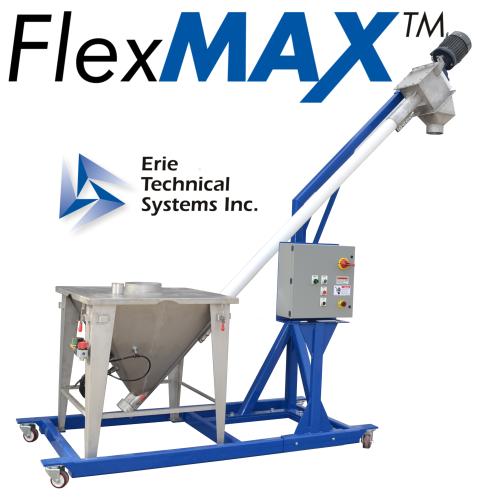At their (coreless) core, flexible screw conveyors (aka helix/helical conveyors, flexible auger conveyors, flex conveyors, or spiral conveyors) are relatively simple machines — a rotating screw moves dry bulk solids from one end of a casing to another, where they are discharged.
"Flexible" is an apt descriptor for these handling systems because:
- In some cases, the plastic (ultra-high molecular weight polyethylene) casing itself is flexible, with the ability to be curved or bent around obstacles.
- They can be configured to suit a diverse range of materials and applications — i.e. flexibility in terms of versatility. Compared to other conveyors, it is easy to disassemble, clean, swap out or modify parts (e.g. shortening or lengthening the casing or auger).
Because of this simplicity and adaptability, flexible auger screw conveyors are a valid, cost-effective solution for many processing operations — as long as the material being conveyed is not too wet, dense, or bulky, and doesn't have too far to go (no more than 40 feet), one of these machines could make a lot of sense for you.
Price of a (standard) flexible screw conveyor: $8,800 - $17,000
Depending on the application and the volume being processed, the configuration of your setup may necessarily be larger, more nuanced, or more complex — and require more of an investment. In this guide, we'll discuss how flexible screw conveyor price is influenced by these factors.
First, let's dissect the anatomy of the "standard" flexible screw conveyor to give us an idea of baseline costs.
Inlet hopper
Typically square-shaped with angled sides (60 degrees), the inlet hopper sits on the ground and funnels/feeds dry bulk material into the conveyor.
Helical auger
The main functional component of the conveyor, the helical auger rotates to push dry bulk material through the surrounding casing, upward toward the discharge head. Augers come in many variations, but the basic flat wire model is sufficient for most free-flowing products.
Conveyor casing
Usually constructed out of ultra-high molecular weight polyethylene (UHMW-PE), the conveyor casing wraps around the auger to create a vessel for the moving bulk material.
Couplings
The couplings join the casing to the inlet (hopper) and outlet (discharge head) ends of the flexible screw conveyor system. They are designed to form a hermetic seal and prevent leakage of the materials being processed.
Drive/discharge head
The discharge head dispenses the bulk material into a container to be either packaged and shipped out or processed further. The driveshaft is powered by a self-contained gearbox and motor to avoid contamination of the product with oil/lubricant.
How operation influences price
The volume and rates at which a material must be processed, as well as the operational considerations of the facility (spacing/clearances, power supply, need for automation), will have an impact on the cost of a flexible conveyor system.
Higher volume/flow rate
To facilitate higher volumes or flow rates of a free-flowing product, we might:
- Widen the conveyor: The typical conveyor nominal ranges between 3 and 6 inches, providing flow rates of 50 to 500 cubic feet per hour. A widened conveyor will necessitate wider couplings and a larger motor and gearbox for the discharge head.
COST: $4,500- $8,000 - Change the auger profile: The standard flat wire auger will do just fine with free-flowing materials weighing in at under 40 lbs/ft3 (640 kg/m3). But for heavier products (over 40 lbs/ft3 or 640 kg/m3), you might swap in a round wire auger or square wire auger (if the particles are large and irregularly shaped).
COST: $500-$1,200
Specialized setups
Facilities cannot always fit standard equipment; so we must design custom equipment that fits the facility.
- Adjusting conveyor path: Ideally, a flexible screw conveyor system will form a triangle between three points — the inlet hopper, the discharge head, and the discharge receptacle — with the inlet hopper being equidistant from both the discharge head and the discharge receptacle The flexible screw conveyor will run at a 45-degree angle between the inlet hopper and discharge head. However, floor space, ceiling height, and obstacles/obstructions may call for adjustments to the conveyor path or length.
COST: $800-$1,200 - Adjusting operational controls: For a smaller, simpler operation or a process requiring less oversight, your machine may require nothing more than a basic on and off switch. For larger, more regulated, or more nuanced operations, we may add variable-speed functionality or interlocks along the conveyor path.
COST: $900-$7,000 - Adjusting for site utilities: A flexible screw conveyor requires an adequate supply of electricity and compressed air to operate; if these are not available at the site, you will need to add a power supply and/or compressor to your machine.
COST: $600-$1,200
How material influences price
What is being processed is perhaps the most critical consideration in how we configure your flexible screw conveyor. Some materials are more finicky than others, requiring modifications to the basic setup in order to move them smoothly through the system:
- Auger selection (continued): For sticky materials with a tendency to pack or smear, we recommend a flat wire auger with a beveled edge.
COST: $100-$500 - Changing casing material: The default UMHW-PE conveyor casing plays well with a wide array of materials, including the food-grade materials often moved through these systems. However, other materials may cause static buildup, corrosion, wear, or overheating.
- An enhanced conductivity casing mitigates the static buildup sometimes caused by moving dry material through plastic tubing.
COST: $2,500-$4,500 - Solid stainless steel casing better resists corrosion, wear, and heat.
COST: $300-$3,800 - Adding a center core: If aeration and fluidization present problems, a core of UMHW-PE can be inserted down the center of your helical auger, preventing buildup here.
COST: $400-$600 - Adjusting hopper angle: For products that pack or smear, we can steepen the sidewalls of the hopper to promote better flow.
COST: $800-$1,200 - Flow aides: For the feistiest of product formats — those that aerate, bridge, rathole, or pack — any combination of flow aides can be added to the inlet hopper.
- Pneumatically actuated fluidizing pads: Introduce air into the product.
COST: $900-$1,200 - Rotary vibrator: Breaks up and separates particles that pack or clump. Can be either electrically or pneumatically actuated.
COST: $400-$900 - Side-mounted auger: Pushes stubborn material out of the hopper toward the conveyor; available in electrically-driven helical or paddle-shaped options.
COST: $4,000-$4,800
The FlexMAX screw conveyor from Erie Technical Systems
If you're done screwing around with inefficient, insufficient dry bulk handling systems, Erie Technical Systems can help. We will discuss your processing operation and needs in-depth to determine the FlexMAX screw conveyor setup with the best features at the fairest price.

